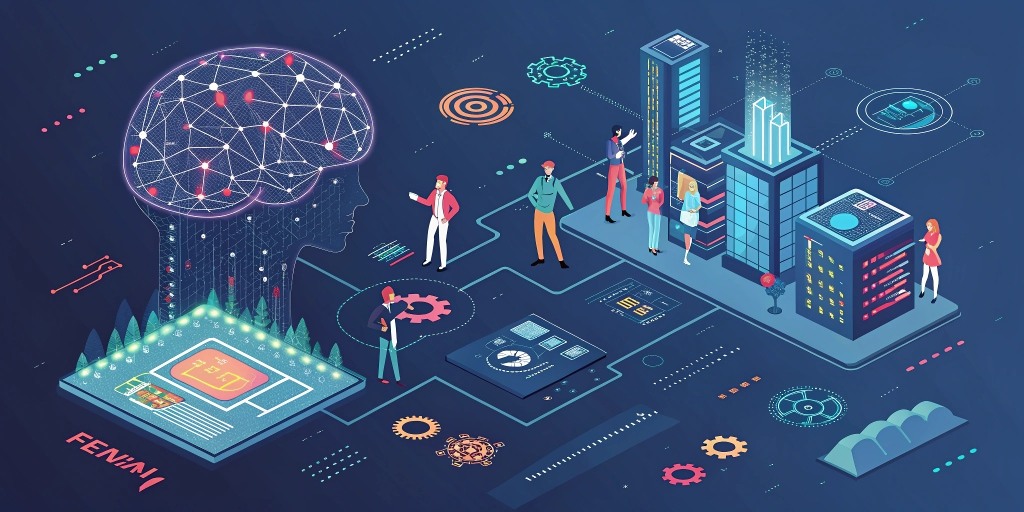As the digital landscape evolves, innovation is no longer optional—it is the engine of growth. Artificial Intelligence (AI) and Machine Learning (ML) have emerged as the key drivers enabling businesses to innovate faster, smarter, and with greater precision. Whether you're a startup or an enterprise, embracing AI and ML is the catalyst for future-ready transformation.
These technologies are no longer concepts for tomorrow—they are actionable tools today. Businesses that integrate AI solutions are already seeing faster turnaround, reduced costs, and smarter workflows.
Redefining Business Efficiency through AI
One of the most immediate advantages of AI and ML is automation. From automating customer queries using chatbots to optimizing back-office tasks like invoice processing or HR workflows, AI reduces manual intervention and minimizes human error.
Machine learning algorithms can understand patterns in business processes and enhance them without explicit programming. This results in leaner operations, faster delivery times, and reduced operational costs.
Smarter Decisions with Real-Time Data Insights
In today’s world, data is a valuable asset—but only if it's used correctly. AI systems analyze massive datasets in real-time to deliver insights that drive better decision-making. From forecasting sales to managing inventory and predicting market behavior, AI can turn raw data into strategic action.
Machine learning models are adaptive. As more data flows into the system, predictions become more accurate. This ability to evolve and refine decision-making gives businesses a competitive edge in fast-moving markets.
Personalized Customer Experiences Powered by AI
AI and ML technologies enable businesses to deliver hyper-personalized experiences. By analyzing customer behavior, preferences, and past interactions, businesses can tailor content, offers, and services that resonate.
Whether it's AI-based recommendation engines in e-commerce or voice assistants offering tailored support, intelligent systems ensure each user feels understood and valued. This personalization boosts customer satisfaction, engagement, and loyalty.
The Role of AI in Product Innovation
AI is playing an increasingly vital role in product development. Through data analysis and simulation, AI can help identify customer needs and test product ideas faster than traditional R&D cycles.
Companies are using AI to monitor market trends, gather user feedback, and even co-create with generative AI tools. This accelerates the innovation timeline, ensuring products reach market faster and are more aligned with user expectations.
Cross-Industry Applications of Machine Learning
Machine learning isn't limited to a single sector. Here are a few examples of how ML is revolutionizing industries:
- Healthcare: Predictive diagnostics, image-based disease detection, and robotic surgeries.
- Retail: Dynamic pricing, demand forecasting, and personalized shopping.
- Finance: Credit scoring, fraud detection, and algorithmic trading.
- Logistics: Smart routing, fleet optimization, and real-time supply chain visibility.
- Manufacturing: Predictive maintenance, quality control, and process automation.
These examples show how versatile and powerful machine learning applications are in solving complex business problems.
Scaling with Enterprise-Grade AI Tools
The rise of enterprise-grade AI platforms has made it easier than ever for companies to scale AI initiatives. Cloud-based AI tools offer flexible infrastructure, pre-trained models, and APIs that plug directly into business systems.
With tools from platforms like AWS, Google Cloud, and Azure, even non-tech companies can integrate machine learning into their workflows. This democratization of AI opens the door for widespread innovation.
Challenges and Best Practices in AI Adoption
Despite its benefits, adopting AI requires a strategic approach. Businesses must:
- Build or acquire clean, labeled datasets
- Train teams in AI literacy
- Ensure ethical AI usage and compliance
- Choose scalable, flexible platforms
- Start with small use cases and scale as needed
By following best practices and avoiding rushed implementation, businesses can ensure a successful AI journey.
The Future of AI and Machine Learning
The horizon for AI and machine learning continues to expand with rapid innovation. Here’s what the future holds:
- AI-powered content creation: Tools that generate text, video, music, and design.
- Edge AI: Processing data locally on devices for faster, real-time AI applications.
- Explainable AI: More transparent models to understand AI-driven decisions.
- AI-human collaboration: Smart systems that enhance—not replace—human work.
These developments will make AI more accessible, intuitive, and impactful than ever before.
Conclusion: Embrace the Future with AI and ML
In the digital age, innovation is the differentiator—and AI is its strongest ally. By adopting artificial intelligence and machine learning, businesses unlock faster growth, sharper decisions, and more meaningful customer engagement.
Whether you're just beginning your AI journey or looking to scale, now is the time to invest in intelligent systems that learn, adapt, and transform. The future of business belongs to those who innovate with AI.


